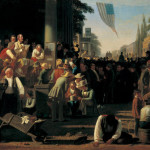Forget all the headlines you’ve read about a Muhammad cartoon contest causing Muslims to engage in mass murder and setting back our efforts to have productive dialogue with the Islamic world. The plot line from Dallas is not that Pamela Geller provoked every Muslim in the world by organizing a conference of people interested in depictions of the prophet Muhammad.
Pamela Geller has pointed out that those who assume that her event offended all Muslims are actually revealing their own prejudice by assuming that all Muslims are the same. A more accurate description of the events that took place in Garland, Texas, would be: “Two fanatical gunmen got shot while trying to slaughter hundreds of innocent people at a cultural event.” Period. End of story.
The fact that the gunmen were Muslim is somewhat relevant, particularly given the possibility that an organized network goaded them to attack. Still, this is still not as relevant as the fact that they tried to kill hundreds of innocent people.
But I would go one step further. The fact that Pamela Geller’s conference was organized around a premise that some Muslims find repugnant—it was a contest to honor artists drawing likenesses of the prophet Muhammad—is really not relevant to the story at all. If something is offensive here, it’s the significant attention that the media have paid to Geller’s supposed stupidity (Jeanine Pirro called the event a “dumb move”) in the aftermath of a terrorist attack on American soil.
Start your day with Public Discourse
Sign up and get our daily essays sent straight to your inbox.I Don’t Just Support Free Speech—I Love Free Speech!
Perhaps I feel relatively safe taking the position I am about to take, because I have never tried to ban flag-burning, do not think barebreasted statues should be covered up when mayors hold press conferences, and would never write to a gallery owner to block an artist who dunked crucifixes in urine. I condemn Marquette University’s firing of conservative professor John McAdams, but I also publicly denounced the proposed firing of liberal Rhode Island professor Erik Loomis, who enraged people with his comments against the National Rifle Association.
I report to work each day on a campus where a wall mural features an upside-down American flag and the university sponsors events like “queering religion.” As a veteran and a Christian, I understand that people are entitled to fund, promote, endorse, and organize things I find very difficult to stomach. Not only can people organize controversial events like Geller’s—they should and must. Thousands of years of literary tradition tell us so. Without such unnerving voices in the public square, we would have never had prophets, dissidents, abolitionists, satirists, jeremiads, or any j’accuse of any kind.
Some of the greatest writers died for what they wrote and said. Socrates was found guilty by his fellow Athenians and forced to drink hemlock. Jeremiah was thrown into a cistern. Demosthenes, according to some accounts, knew that Alexander the Great was going to slay him for defaming his father, so he bit a reed filled with poison before he could be arrested. Cicero and St. Paul both had body parts chopped off by authorities angry over what they were saying. Martin Luther King Jr. and Malcolm X joined their ranks two millennia later.
Kathleen Parker calls Pamela Geller a “spectacle.” You know who else was a spectacle? Socrates. Galileo. John Hancock. I don’t know whether Pamela Geller anticipated or knew of an impending attack against the conference. I do know that Martin Luther King anticipated and knew he was going to be attacked when he brought women and children into public “spectacles” of defiance.
Would our civilization be better had Dante Alighieri toned down his crude caricatures of religious figures he considered corrupt, including the prophet Muhammad? Would it have been better for Martin Luther to whittle down his ninety-five theses to just the five or six that wouldn’t offend the world’s hundreds of millions of Catholics? Would the British have had a change of heart and liberated Ireland had Jonathan Swift not written his ghastly satires? Would the Napoleonic wars not have taken place if William Blake had not engraved the devilish images in Europe? If Emile Zola had made his “Lettre à la France” a little less accusatory toward his religious countrymen, would the Dreyfus Affair have ended more favorably and would calmer attempts to fight anti-Semitism have prevailed?
No, no, and no. We do not merely allow for free speech in liberal democracies; we crave it—all of it, from the vilest and most repulsive to the most glowingly optimistic and saccharine, including the hyperboles, the jests, and the vicious attacks.
Not only do I understand that the First Amendment protects such expressions—I also understand, as an English professor, that there is something productive and even fruitful about provocation, boldness, and risk-taking. What many call “hate speech” I prefer to call “risky speech.” It is an idea or a thought that may never persuade others and is not guaranteed to lead people toward virtue. On the other hand, it might turn out to be just what’s needed. We don’t know until we let the idea get out there. If I must draw a line, I draw the line at slander or fraud—lying, even in the name of progress, is far worse than hatred. As a person of color and self-identified sexual minority, I can go so far as to say I welcome bigotry because sometimes even bigots are right. Social groups can have generalized flaws, communal blind spots, and collective guilt over things their community did or failed to stop. Criticizing them en masse is perfectly legitimate and is sometimes necessary.
Geller’s Critics Are Lacking in Literary History
It is clear that the debate circling around Pamela Geller is not a question of whether she behaved lawfully. Both sides see, for the most part, that we are not debating law. We are debating, rather, the question of artistic merit. Almost everyone, including people who defend Geller’s right to hold her conference, seems to believe that the cartoon contest was empty provocation, devoid of intellectual value. By extension, they assume that Pamela Geller is not very bright and people who admire her are even less so.
America has suffered a great loss with the decline of the humanities. If people knew their literary history, they would know about the glorious history of invective. The best graduate seminar I ever taught was, in fact, a class I called the “History of Invective.” Eighteen graduate students and I broke down the legacy of “hate speech” into four clear genres: the jeremiad, the philippic, the j’accuse, and the lampoon. Each of these genres has both ancient luminaries (such as Demosthenes for the philippic, and Juvenal for the lampoon), but also a genealogy of writers working in these scathing traditions, threaded through the Middle Ages, the modern era, and up to today. We debated vociferously where to place Ann Coulter, for instance. Eventually, we decided that she belongs to the tradition of the jeremiad.
If we took time to study the descent of today’s hate speech from earlier lights such as Cicero, Isaiah, and Aristophanes, we would not have so many people claiming to be cultural authorities, showboating in the press to say, “Pamela Geller’s event was culturally worthless and holds no value.” History says otherwise.
The Daily Beast published an article by Dean Obeidallah entitled “Muslim-Bashing Can Be Very Lucrative,” which basically accuses Geller of inciting violence to fatten her own bank account. The Washington Post’s famous Palin-hater, Kathleen Parker, published an article titled “Pamela Geller’s Abuse of Free Speech,” which includes this nugget:
But Geller is a media creature and knows how to bait a media field as well. Make noise and the media will come. Draw a crowd and the cameras will roll. Become the “victim” of death threats – in essence, a fatwa – and voilà, you’re on TV. (The MGM lion better watch his back.)
Geller got exactly what she wanted. You’re nobody in this town until you’ve been fatwa-ed.
Who do these people think they are? They don’t know Pamela Geller. They don’t know her motives. And worst of all, they don’t know the history of literary traditions based on invective.
There Is a Better Way to do Cultural Criticism
Unfortunately, many press outlets seemed to spend more time dwelling on Geller’s motives and character than on the lunacy and blind hatred of two terrorists who tried to kill hundreds of people who were just attending a cultural event in a Dallas suburb.
Pamela Geller organized a cultural event—just like any gallery opening, guest lecture by a visiting scholar, or gala to honor an author. People schedule events and gather in public places to talk about art, culture, literature, history, and current events. They even gather to talk about politics. A gathering devoted to awarding cartoonists for depictions of a major historical figure is no different from any of these other cultural events.
Don’t get glib and say, “Pamela Geller was looking for trouble,” “Pamela Geller knew this was going to happen,” “Pamela Geller wanted this,” “Pamela Geller makes money by doing these things,” or “Pamela Geller made a dumb choice.” These are the disclaimers and caveats that even people partially defending her have felt obliged to throw into their screeds, lest readers be tempted to step back and ask whether Pamela Geller has a point. Given the long line of provocateurs and enfants terribles who left us the history of literary invective, the legitimacy of her event is strong and the illegitimacy of those who call her stupid is obvious. Maybe present-day Islam is developing a serious problem with intellectual and artistic discourse, and we have to work on them, not beat up on her.
Hypersensitive Muslims (who do not represent all Muslims) are up against history. So, too, are their distracted and narrow-minded apologists, who are overconfident in their own judgment of what has cultural value and what doesn’t. We need offensive cartoons, obnoxious cartoonists, and offended sensibilities. Without them, society stagnates and tyranny reigns.














